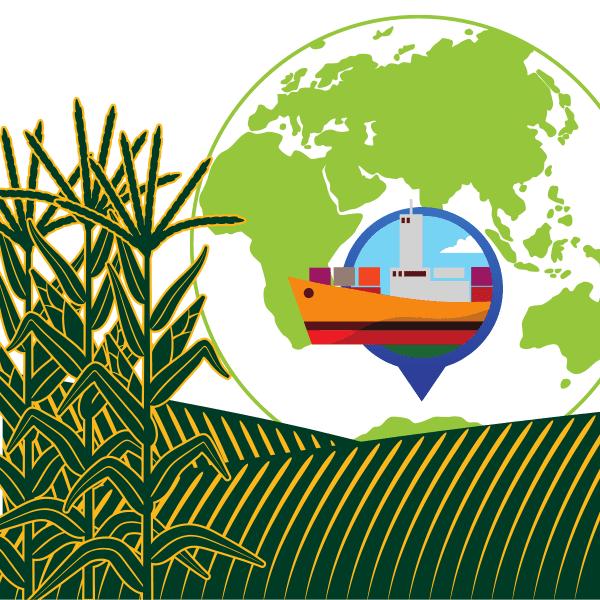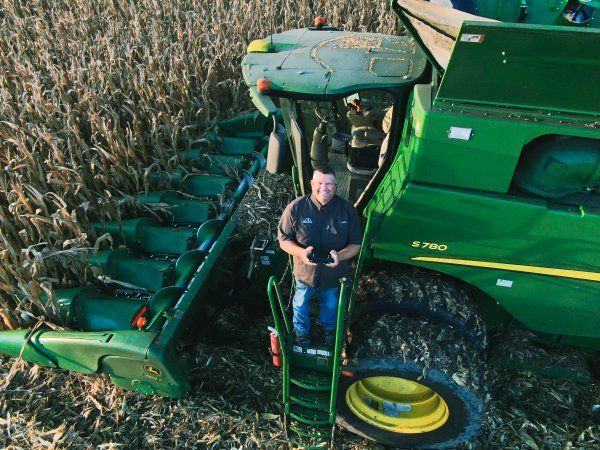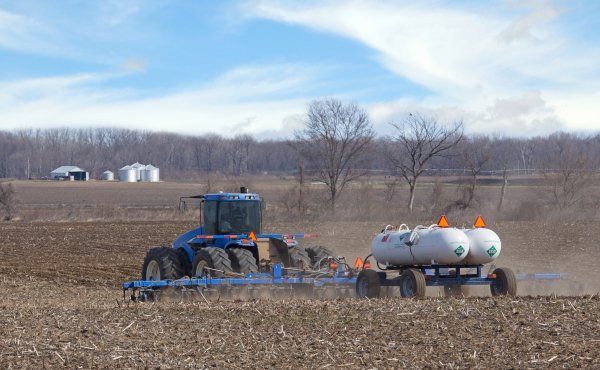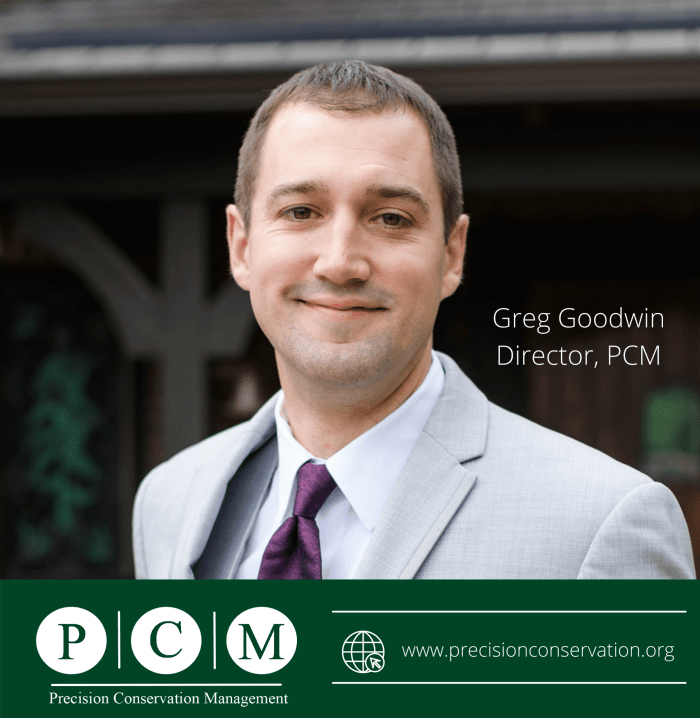Featured Article

February 24, 2022
When John Enns climbed up on his rye wicker on a beautiful day in 2004, he was looking forward to spending time in the field. Excited about riding his recently purchased equipment, he didn’t know he was moments away from having his life change forever. As Enns drove the tractor out of a ditch, it flipped over, trapping him under the weight of the machinery. He had two broken vertebrae, five broken ribs and was paralyzed from the waist down. Enns found himself going through hours of physical therapy and trying to navigate a world that often turns a blind eye to those who live with disabilities. Suddenly, Enns was trying to get his wheelchair over steep curbs, trying to climb on top of his tractor without use of his legs and trying to make it up flights of steps at public buildings.

February 18, 2022
In case you forgot, American agriculture is a powerhouse. Here’s your reminder: Final calendar year 2021 trade data published by the Department of Commerce earlier this month shows that the American agricultural industry reached its highest annual export value ever recorded in history. Exports of U.S. farm and food products to the world totaled $177 billion, topping the 2020 total by 18 percent and eclipsing the previous record, set in 2014, by 14.6 percent.

February 17, 2022
During yesterday’s U.S. Senate Committee on Environment and Public Works hearing, Senator Tammy Duckworth coordinated with Senators Ernst and Stabenow to set the record straight on the benefits of corn-based ethanol. Duckworth asked very important questions of Emily Skor, Growth Energy, during the hearing, which allowed answers to be entered into the record regarding the cost saving benefits of corn-based ethanol.

February 17, 2022
In accordance with Section 21 of the Illinois Corn Marketing Act, the Illinois Corn Marketing Board petitioned the Director of the Illinois Department of Agriculture to conduct a referendum to consider a proposed amendment to the Illinois Corn Marketing Program. The proposed amendment would increase the current voluntary corn checkoff rate by 2/8 cent per bushel. The referendum would increase the current voluntary checkoff rate to 7/8 of a cent per bushel. The Director held a public hearing on February 10th, 2022 for the purpose of informing the public of the proposed change to the marketing program and to solicit public comments both written and oral. The hearing was held at the Department of Agriculture Administration Building, State Fairgrounds, Springfield, IL. After the hearing, the Illinois Corn Marketing Board met and voted to proceed with the referendum.

February 17, 2022
I got the chance to catch one of the founders of Nayak Farms, Dr. Nayak, and was extremely impressed by their mission and how they’re helping Illinois. Here’s a brief summary of what I learned. Nayak Farms Background Dr. Nayak founded the Strength to Love foundation that passionately believes that all human beings have the universal rights to livery, food, shelter, clothing, healthcare, education and work. From that foundation, Nayak Farms was born. Farmland currently in Gardner, Illinois – farmed by a tenant of Dr. Nayak. One of the main goals of this farm is to help logistically coordinate the largest donation of sweet corn in Illinois hoping to also be a model to other sweet corn farmers later and continue the efforts to feed Illinois.

February 10, 2022
The grand prize winner of the National Corn Growers Association(NCGA) 2021 photo contest is Todd Wachtel from Altamont, IL. NCGA does this contest every spring and gives out 26 prizes with different categories. IL Corn caught up with Todd to get to know a little bit about him. A 5th generation farmer from Altamont, IL, Todd, his father and uncle grow corn and soy. “I was lucky enough to get to farm for 20 years with my grandfather as well,” says Todd. Growing up he loved the farming lifestyle and has been happy to provide the same opportunity to his son. While still loving the lifestyle, he currently enjoys seeing how quickly technology is changing all aspects of farming.

February 3, 2022
Dear Illinois Corn Growers Association Members: Farmers all over the state have struggled with fertilizer prices and availability this fall and winter. On our farm, we fall-applied anhydrous on more acres than we typically would, just to be sure we could get nitrogen in the ground. This is something we did not want to do. Over the past few years, we’ve transitioned to more in season and side dress applications that fit our agronomic, stewardship, and economic goals. However, the uncertainty in the market forced us to change our approach - we saw no other viable options. We here at Illinois Corn Growers Association (ICGA) never want farmers to be in this position again and will continue to work hard on long term solutions to this complicated problem. ICGA leaders and staff have been engaged on this issue since the summer, when we saw prices starting to rise quickly. The problem is global in nature, with supply chain and energy disruptions causing fertilizer plants to shut down and countries to restrict exports. Over the last two years in the US, fertilizer manufacturers have sought and received protections from the Department of Commerce which will raise the price of imported phosphate and UAN. This all is occurring during a period of high commodities prices and increasing demand for fertilizers. It truly is a perfect storm for farmers and ag retailers who are caught in a situation they have no control over. We are working to ensure that this never happens again. Here is a short overview of just some of the activities your leaders and staff have undertaken on your behalf: We engaged directly with fertilizer manufacturers, like CF Industries, to illustrate the impact of high prices on farmers and find opportunities for them to help protect their end customers. We held “calls to action” among our members, in which 107 farmers participated, so they could tell the manufacturers their own story. On the legislative front, we have helped educate our congressional delegation about the issue, particularly those serving on the House Agriculture, and Ways and Means Committees, but also our Senators. Through the National Corn Growers Association (NCGA), our partner in DC, we’ve helped raise broad awareness of the problem. I signed on to a letter with other corn states to the Mosaic Company, asking them to withdraw their petition for tariffs on imported phosphate. NCGA has joined a legal challenge to allow more imports of potassic fertilizers and helped fund an analysis of the US phosphatic fertilizer market. In cooperation with other corn states and with a grant from the Illinois Corn Marketing Board (ICMB), we helped fund an analysis of the US nitrogenous fertilizer market by ag economists at Texas A&M. We will continue to work with your ICMB to leverage checkoff funds to develop new education materials and risk management tools in cooperation with the University of Illinois’ FarmDoc team of ag economists. The ICMB and ICGA have also cooperated to bring you up-to-date industry insights from Josh Linville, Director of Fertilizer for StoneX, at our annual meeting and through webinars like this . We have started discussions with Illinois Attorney General Kwame Raoul and his staff about the legal tools we may have to address this highly consolidated market and are helping to coordinate other states’ Attorneys General to all work together to find durable solutions to this systemic problem. Although this list is not exhaustive, I hope you get a feeling for how much time and energy has gone into this issue. Sadly, I do not expect to see any major reversal in the trend, short of global prices beginning to soften, soon. We firmly believe that the best approach to the problem is a long-term approach. We will continue to work to create more competition in the fertilizer marketplace, protect farmers from predatory contracting, increase fertilizer market transparency, and develop tools for farmers to manage their fertilizer risks. Sincerely, Marty Marr

February 2, 2022
IL Corn welcomes Greg Goodwin to the Precision Conservation Management (PCM) team as the Director. We're excited for Greg to join the PCM team. Greg has an extensive background in helping farmers and environmentalists understand how agricultural chemicals can impact our environment. He holds an M.S. in Agricultural Engineering focused in Soil and Water Resources from UIUC. Greg will direct and oversee the PCM program which includes overseeing daily operations, business development, grant reporting, budget analysis and more.
Articles
2026
2025
2024
2023
2022
2021
2020

